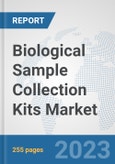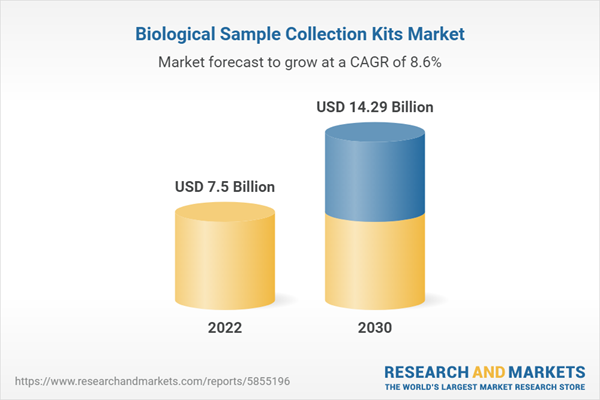Biological sample collection kits are widely used in various fields such as healthcare, research, and diagnostics. These kits are designed to facilitate the collection, transportation, and preservation of biological samples such as blood, urine, saliva, tissues, and DNA/RNA samples. They often contain specific components and reagents necessary for the collection process, such as swabs, tubes, transport media, preservatives, and instructions for use. Numerous applications, such as genetic testing, molecular diagnostics, clinical trials, and epidemiological studies, depend greatly on biological sample-collecting kits. They aid in maintaining the stability and integrity of the samples that have been gathered, enabling precise and dependable laboratory analysis. Due to the rising demand for diagnostic and research applications, there is an increase in the demand for biological sample collection kits.
Swab-based collection kits are expected to grab a high share of the biological sample collection kits market due to several factors. These kits, consist of sterile swabs and transport media, provide a convenient and standardized method for non-invasive sample collection. Swab-based methods are more user-friendly and comfortable for patients compared to invasive procedures for instance venipuncture or tissue biopsies. They can collect various analytes including pathogens, genetic material, and cells, making them versatile for different applications such as infectious disease diagnostics and genetic testing. The ease of use and convenience offered by swab-based collection kits contribute to efficient and standardized sample collection. Additionally, the inclusion of transport media ensures the preservation of sample integrity during transportation, allowing for reliable analysis in laboratories.
North America is expected to grab a high share in the market, due to several factors. The region benefits from the presence of key players, a well-established healthcare infrastructure, advanced diagnostics laboratories, and renowned research institutes. Additionally, the increasing awareness of the importance of early-stage disease diagnosis has propelled the demand for biological sample collection kits. The strong support and high technology growth from top companies in North America has further facilitated market expansion. The region's growing need for customized medicine and the emphasis on personalized healthcare have also contributed to the market's growth. Moreover, regular health check-ups among the senior population have spurred the adoption of convenient and user-friendly home-based sample collection kits.
Report Findings
1) Drivers
- The factor which drives the growth of the market is an increasing demand for accurate and rapid diagnostics, as accurate diagnosis plays a crucial role in understanding diseases and prescribing effective treatments.
- The rising prevalence of infectious diseases, chronic conditions, and genetic disorders fuels the demand for diagnostic testing, making biological sample collection kits an essential tool for sample collection in these areas.
2) Restraints
- The market growth may be constrained by high cost, particularly in low-income nations where the accessibility of kits might be limited.
3) Opportunities
- Technological advancements give companies the chance to create unique sample collection kits. To increase the effectiveness, precision, and user-friendliness of the kits.
Research Methodology
A) Primary Research
The primary research involves extensive interviews and analysis of the opinions provided by the primary respondents. The primary research starts with identifying and approaching the primary respondents, the primary respondents are approached include1. Key Opinion Leaders
2. Internal and External subject matter experts
3. Professionals and participants from the industry
The primary research respondents typically include
1. Executives working with leading companies in the market under review2. Product/brand/marketing managers
3. CXO level executives
4. Regional/zonal/country managers
5. Vice President level executives.
B) Secondary Research
Secondary research involves extensive exploring through the secondary sources of information available in both the public domain and paid sources. Each research study is based on over 500 hours of secondary research accompanied by primary research. The information obtained through the secondary sources is validated through the crosscheck on various data sources.The secondary sources of the data typically include
1. Company reports and publications2. Government/institutional publications
3. Trade and associations journals
4. Databases such as WTO, OECD, World Bank, and among others.
5. Websites and publications by research agencies
Segment Covered
The global biological sample collection kits market is segmented on the basis of product, application, and end-use.The Global Biological Sample Collection Kits Market by Product
- Swabs
- Viral Transport Media
- Blood Collection Kits
- Others
The Global Biological Sample Collection Kits Market by Application
- Diagnostics
- Research
The Global Biological Sample Collection Kits Market by End-use
- Hospitals & Clinics
- Home Test
- Diagnostic Centers
Company Profiles
The companies covered in the report include- BD
- HiMedia Laboratories
- BTNX Inc.
- Siemens Healthcare GmbH
- Thermo Fisher Scientific, Inc.
- Cue Health Inc.
- F. Hoffmann-La Roche Ltd
- QIAGEN
- Hardy Diagnostics
- altona Diagnostics GmbH
What does this Report Deliver?
1. Comprehensive analysis of the global as well as regional markets of the biological sample collection kits market.2. Complete coverage of all the segments in the biological sample collection kits market to analyze the trends, developments in the global market and forecast of market size up to 2030.
3. Comprehensive analysis of the companies operating in the global biological sample collection kits market. The company profile includes analysis of product portfolio, revenue, SWOT analysis and latest developments of the company.
4. Growth Matrix presents an analysis of the product segments and geographies that market players should focus to invest, consolidate, expand and/or diversify.
Table of Contents
Companies Mentioned
- BD
- HiMedia Laboratories
- BTNX Inc.
- Siemens Healthcare GmbH
- Thermo Fisher Scientific, Inc.
- Cue Health Inc.
- F. Hoffmann-La Roche Ltd
- QIAGEN
- Hardy Diagnostics
- altona Diagnostics GmbH
Table Information
| Report Attribute | Details |
|---|---|
| No. of Pages | 255 |
| Published | July 2023 |
| Forecast Period | 2022 - 2030 |
| Estimated Market Value ( USD | $ 7.5 Billion |
| Forecasted Market Value ( USD | $ 14.29 Billion |
| Compound Annual Growth Rate | 8.6% |
| Regions Covered | Global |
| No. of Companies Mentioned | 10 |









